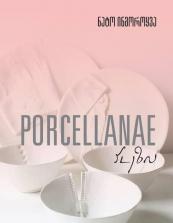PORCELLANAE
‘Some may think that such poetry can be created endlessly but they are badly mistaken. Ingoroqva perfectly manages to make a dead dross alive with a sudden findings, to create an appropriate tune and from all this make a very beautiful poems.’
Givi Alkhazishvili, writer
‘It has taken a long time for NatoIngoroqvato find herself and the precise words to write all the poems that are published in this book. NatoIngoroqva is the poet of precise words for recent times.’
Giorgi Lobzhanidze, poet, Translator
‘For want of a better word, I call the transcripts of the thoughts ‘Dry Things’. Here words and sentences may be incomplete but the meaning is quite understandable and makes emotional sense. The lyrics are laconic and fragmented. Phrases are short but expansive. No unnecessary noise.’
Temur Chkhetiani, poet
‘You will never find out NatoIngoroqva in any one poem. Her book seems to be created very rigorously, and attentively; the work of author and editor is vivid. So, the reader has the pleasure of finding a special logic while reading. Nato Ingoroqva is a poet who has a lot to say. You will find all sorts of lines in her poems ‘I must finish attending to myself today, I must write about others or for the others from now on.’ These words can serve as an epigraph for her book.’
Malkhaz Kharbedia, literary critic
‘Each collection of poems is a period of life, and writing, and accordingly, you write about the things you want to do, however others may perceive things. The fact is that this is not self-irony ... but we have, incidentally, her own moments of watching from a distance. There is too much death is in this book: there was such a period of Nato’s life and this book for me is a something that somehow describes death using simple linguistic formulas. And if you read this book without observing such linguistic and grammatical games, as a reader you will miss a lot of things, because sometimes a lexical unit completely opens the book and the concept. For example, it became very obvious to me that porcelain destroys itself and can be ruined - and the subject or the object of this book is too fragile.’
Diana Anphimiadi, writer
In case of using the information, please, indicate the source.
